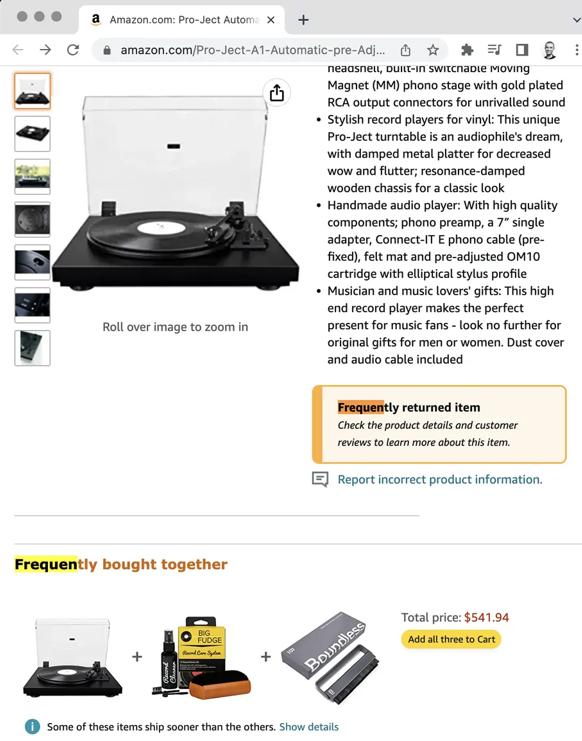Amazon Attempts to Reduce Returns With a New Fee and Warning to Customers


While Amazon’s return policy is already impressive, the company is hoping consumers won’t have to return items as frequently with the installment of their newest feature. The ecommerce giant recently announced that they are now flagging high-return items on product detail pages to warn customers prior to purchase. This new badge will encourage customers to dive a little deeper into product research and reviews before purchasing, ensuring they are receiving the exact item they want/need.
“At Amazon, we’re always innovating on behalf of customers to improve the shopping experience,” Amazon spokesperson Betsy Harden said in a recent email. “We’re currently showing return rate information on some product detail pages to help our customers make more informed purchase decisions.”

Amazon’s current return policy allows customers to return qualified items shipped from Amazon.com, including Amazon Warehouses, within 30 days of delivery. The ecommerce platform is clearly looking to cut costs on returns with this new feature, and with the recent change of charging customers a fee for some UPS returns. Amazon has just begun charging a $1.00 fee when customers drop off product returns at a UPS location instead of a nearby Amazon Fresh, Kohl’s, or Whole Foods.
Amazon spokesperson Lauren Samaha said in a statement to Money that the company will continue to offer at least one free option for customers to return items without a box or a label but acknowledged that customers may face a fee using the UPS option.
It’s clear Amazon is on a mission to slash their rate of returns, but what does this mean for brands that sell on the platform?
The release of the “frequently returned” badge can put brands at a serious disadvantage, especially when their products require customer education. The new badge calls attention to the returns, and can seemingly encourage customers to rethink their purchase. Brands are left to Amazon Support to run interference.
“In putting the customer first, Amazon usually accepts the majority of return requests, regardless of the reason. When products require sufficient know-how, it puts the brand at a disadvantage to not be able to use their own customer service to answer questions. Within days of this being implemented, a client of mine had a top item suppressed due to a 28% return rate. In looking at the customer complaints provided by Amazon, the majority were subjective, and ultimately due to misunderstanding of use.”
— Megan King, Sr. Account Manager at Tinuiti
What steps can your brand implement to avoid the “frequently returned” badge? While it’s not a perfect science, and returns will inevitably happen, here are a few tips to limit returns on Amazon.
Product descriptions are a critical component of selling a product on Amazon. Writing effective product descriptions can take time, but it’s important to put in the extra effort to ensure you are describing the product accurately and fully. Make sure you are including the basics like specs, features, functions, and benefits of your products so shoppers know exactly what they are purchasing from the start. Check out our tips on writing effective product descriptions.
Visuals are everything when it comes to online shopping, especially on Amazon. Consumers want to see the product they are interested in portrayed clearly and accurately and you can easily provide that by including high-quality images and videos in your listings. Great photos and videos can help secure buyer confidence and limit returns. Learn more about Amazon image requirements and tips here.
Amazon A+ content is available for select sellers on Amazon—currently including 1P vendors, emerging brand owners, and Amazon Brand Registry sellers. A+ Content integrates detailed product descriptions, rich images, charts, and narrative copy to help customers make informed buying decisions.
Product reviews are crucial when selling on Amazon. Positive reviews instill confidence in your products and give consumers a deeper understanding of the item they are buying. Check out some of our top tips for getting reviews on Amazon. Keep in mind that gaining reviews is simply not enough, be sure to follow up on any negative reviews, or neutral reviews that cite a concern.
As always, we will keep you informed on the latest news from Amazon. If you have any questions about these new updates, or if you’d like to get started selling on the platform, contact us today.
